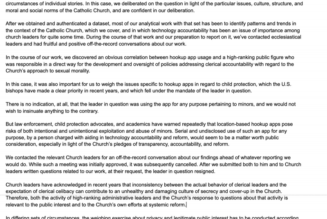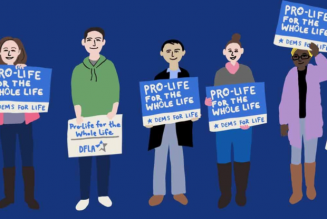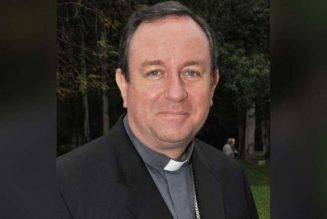By Dr. Jeff Mirus ( bio – articles – email ) | Dec 09, 2022
This morning, starting at 7:15 am EST, CatholicCulture.org was the target of a robotic registration attack. This means a computer or a group of computers had been programmed to attempt rapid-fire registration on CatholicCulture.org. Sometimes the purpose of such attacks is to test stolen credit card numbers. At other times, the purpose is purely disruptive. However, since we had coded over the years an extensive number of registration/donation tests based on past experience with such attacks, I found on examination that none of these attempts—1,698 in all over a period of 4 hours and 28 minutes—got past our defenses.
But the speed of the attack varied, and I became aware of it a little after 9:00 am when our website became non-responsive three times in the space of about a half-hour. Poking around and looking at various indications of digital health, I eventually realized the cause, and I blocked the IP address of origin in our firewall. But this got me thinking about…Divine Providence. This is just a doorway into a big topic, but I hope you will think about it too.
Providence at work
It would be silly, of course, to suggest there are times when Providence is not at work. But there are definitely times when we become more aware of its workings. This was one of those times for me because, after all, if this attack had been launched on the previous day (December 8th), our site would have gone down several times in the midst of the final day of our Fall Challenge campaign, during which we needed every precious second to reach our goal. Moreover, to have donors hit dead-ends when they are trying to help you out of a tight spot is a non-profit organization’s nightmare. Instead, we had to deal with it only after we had reached our goal, and for that I am certainly even more grateful than usual for God’s Providence.
Now to the larger picture: When St. Teresa of Avila fell down fording a muddy stream on one of her apostolic journeys in the sixteenth century, she is said to have raised her thoughts to God to offer this unusual prayer: “If this is how you treat your friends, no wonder you have so few!” Indeed, there are a variety of legitimate spiritual thoughts that enter into our conversations with Christ, and a wry humor is by no means excluded—as long as we don’t take ourselves too seriously.
My larger point in discussing Providence ties in nicely with my commentary on Tuesday, The refusal to preach purity in the face of sexual license. In the conclusion of that essay, I offered this thought: What I am saying is that this refusal to communicate God’s will is not only utter nonsense but a deliberate denial of the mercy and goodness of God, as if people somehow have a “better chance” if they do not know Him!
It may be helpful to hold this thought—this criticism—as we consider again that statement of St. Paul in his Second Letter to the Thessalonians, in which he explains that it is fitting that God should execute justice on those who afflict the elect (Christians), and cause them to suffer,
when the Lord Jesus is revealed from heaven with his mighty angels in flaming fire, inflicting vengeance on those who do not know God and on those who do not obey the gospel of our Lord Jesus. They will suffer the punishment of eternal destruction, away from the presence of the Lord and from the glory of his might, when he comes on that day to be glorified in his saints, and to be marveled at among all who have believed. [2 Thes 1:7-10]
Now there are two things here that are worthy of notice, since every passage in Scripture must be interpreted in light of every other passage which touches the same subject, just as every statement of the Magisterium of the Church must be interpreted in light of every other Magisterial statement and all of Scripture itself—for it is easy to seize upon one particular word or phrase which may be interpreted in a variety of ways, and so leap to conclusions which are unwarranted when the whole is taken into account.
In this passage, again, there are two such issues. The first is St. Paul’s expression “eternal destruction”. Some have argued that this means the souls of the damned will be blotted out of existence, but we know from many other Scripture passages and Church teachings that this is not the case, and that those who who are damned suffer the pain of the loss of God for all eternity. Therefore, “eternal destruction” is to be taken in the sense of a sort of final “spiritual undoing”, a final loss of the presence of God, which in fact prevents what we might call our own personal fulfillment forever. To be unhappy for all eternity: This is perhaps a greater incentive than ceasing to exist.
However, I hasten to add that both the state of the damned in Hell and the state of the blessed in Heaven are impossible for us to fully comprehend, let alone put into words. The most important thing is to take the Revelation that we do have from God seriously.
The second confusing thing is Paul’s statement that this punishment will fall “on those who do not know God and on those who do not obey the gospel of our Lord Jesus”. A moment’s reflection (as well as a host of other Scripture passages and Magisterial teaching) reveals to us that there is no fault in those who do not know God if they have never had any reasonable opportunity to know Him. For example, from an external perspective (that is, apart from what God may do within the human soul), nobody would suggest that infants are damned, or that all those are damned who have not had a chance to hear the Gospel. Quite apart from how God may make Himself known in the depths of the soul, other more serious questions arise—namely, the extent to which distance from God is the result of our rejection of Him rather than merely our ignorance.
Opportunities lost and gained
It is true that there are many ways to know something of God and of the Good, even apart from hearing the Gospel or being brought up in the Church. There is a completeness in God’s plan which, when we reflect on it seriously, is quite stunning. First, as the author of all things, God reveals both Himself and the Good in general through nature, implicitly, in the things He has made. It is “only” in the second place that He discloses Himself in words and the Word through a specific body of explicit Revelation.
While not all are exposed to what we call Revelation, all (at least all who have their intellectual faculties) are exposed to God and the Good as known through nature. And all (at least all whose wills are not impaired) can respond to this knowledge by seeking either to follow or turn away from what they can discern naturally about God and the Good. This is why the Church teaches that those who seek to follow what they know naturally of God and the Good can also be saved, even if they never come into contact with Divine Revelation and the Gospel of Jesus Christ.
But my point here is that we ought to maximize the chance for every human person to be exposed to and enlightened by the fulness of God’s self-revelation, by the fulness of God, the knowledge of His holy will, and the real Presence of Christ who has sacrificed Himself precisely to overcome sin and draw each of us to the Father. The more we are exposed to these realities, the better off we are—the greater the chance we have to fulfill God’s most ardent desire. This is why St. Paul wrote to Timothy:
First of all, then, I urge that supplications, prayers, intercessions, and thanksgivings be made for all people…that we may lead a peaceful and quiet life, godly and dignified in every way. This is good, and it is pleasing in the sight of God our Savior, who desires all people to be saved and to come to the knowledge of the truth. [1 Tim 2:1-4]
Now, what are we to say? That it is best for people to be left in as much ignorance as possible, lest they make the wrong choices and so be cut off? No, this sort of laziness is simply an excuse for two kinds of errors: First, the error that everyone enjoys eternal happiness in the Presence of God no matter what (which we do not know to be the case through either natural law or Divine Revelation, and for which there is a great deal to the contrary, including the passages cited here from St. Paul himself); and second, the error that the Gospel of Christ and the ministry of Christians does not offer a greater likelihood that people will make an informed and engraced decision for or against God than any other possible course of action.
Conclusion
Look: There is nothing in what St. Paul calls the “old man” that finds the Gospel of Christ easy, but there is everything about the Gospel that is liberating if we will but accept it and put on the “new man”. Anyone who believes that the Gospel and the Church Christ founded do not give us all a better chance to know, love and serve God in this life, and be happy with Him forever in the next, is in denial. And that denial makes God a liar. Ninety-nine times out of a hundred—or more—this denial springs from our fallen natural fear of either giving up our sinful pleasures or incurring the displeasure of “those who matter” by the standards of this world.
Perhaps it is time to read St. Augustine’s own comment on all this, drawn from his famous Confessions:
Late have I loved you, beauty ever ancient and ever new: late have I loved you. And see, you were within and I was in the external world and sought you there, and in my unlovely state I plunged into those lovely created things which you made. You were with me, and I was not with you. The lovely things kept me far from you, though if they did not have their existence in you, they had no existence at all. You called and cried out loud and shattered my deafness. You were radiant and resplendent, you put to flight my blindness. You were fragrant, and I drew in my breath and now pant after you. I tasted you, and I feel but hunger and thirst for you. You touched me, and I am set on fire to attain the peace which is yours.
For Augustine’s liberation, credit Jesus Christ working through everything, but especially through his mother St. Monica and his father in Faith, St. Ambrose. I repeat the point I made rhetorically before: We are not better off in ignorance. Every human person can benefit enormously from hearing the truth about Jesus Christ and His Church, about human sin and divine salvation. As far as we know, not all will benefit. But the point we must keep in mind is that everyone can benefit, if only they will, and that the big three—Christ, the Gospel and the Church—are far more powerful and far more gracefully magnetic than anything in nature alone.
We must not place limits on such goodness, such opportunity. Nature alone may do in a pinch, but it is nowhere near all that we have. And if Our Lord cannot reach souls even through those who can offer the fullness of truth and grace, then surely nature alone will never be enough.
We do no favors when we hide the Good News. Christ’s Church is Providence in its highest and most perfect work of sacramental union wth the Lord.
Sound Off! CatholicCulture.org supporters weigh in.
All comments are moderated. To lighten our editing burden, only current donors are allowed to Sound Off. If you are a current donor, log in to see the comment form; otherwise please support our work, and Sound Off!

There are no comments yet for this item.
Join Our Telegram Group : Salvation & Prosperity









